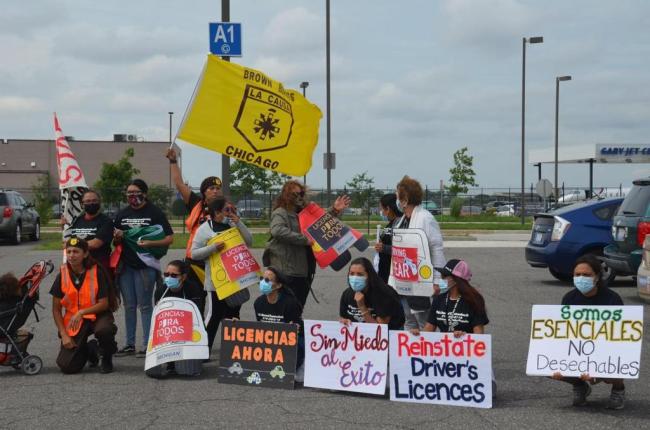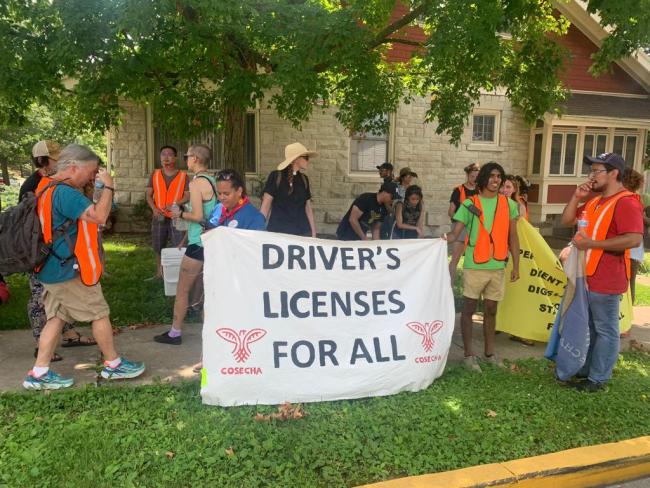
In January 2021, activists with Cosecha Indiana, a state branch of Movimiento Cosecha, unfurled a blanket across the White River State Park Bridge in Washington, Indiana. The blanket read: “Licencias Hoy Papeles Mañana” (Licenses Today, Papers Tomorrow), and was displayed as part of a campaign to raise awareness about the importance of legalizing access to driver’s licenses for undocumented residents. The slogan highlights how these advocates see access to driver’s licenses as an essential first step in the broader push for comprehensive immigration reform.
For millions of undocumented people that reside in the United States, the fear of detention and deportation looms each time they get behind the wheel of a vehicle. The simple and often necessary tasks of driving to work, seeking medical care, picking up groceries, or taking your children to school can become life-altering experiences. Even during the Covid pandemic, workers deemed “essential” laborers could face disproportionate prosecution for the simplest of traffic violations. Despite being an integral part of the labor force across the United States, undocumented communities live in fear of doing something that many of us take for granted.
Currently, 32 states do not permit undocumented residents to drive a car legally. In 2022, Rhode Island enacted legislation to extend driver’s licenses and identification cards to residents regardless of citizenship status. Voters in Massachusetts rejected a bill that would have repealed a new law granting access to licenses for undocumented residents. In other states, the struggle for expanded access to driver’s licenses is making key progress. In January 2023, Minnesota’s House passed a bill granting access to undocumented residents. In Pennsylvania, the coalition PA Forward continues to mobilize to expand license access to the state’s estimated 900,000 undocumented residents. In Indiana, activists associated with Movimiento Cosecha hope to make the state the 19th to expand access to driver’s licenses. The campaign represents a critical battleground in the United States’ ongoing immigration debate.
The Biden Administration campaigned on a promise to develop a path to citizenship for the 11 million undocumented people living in the United States. In the context of renewed and, to some degree, intensified xenophobia, Biden and his administration have pledged to reform outdated immigration laws and undo initiatives enacted by the Trump Administration. In January, Biden announced a new immigration plan to allow 30,000 migrants per month from Cuba, Haiti, Nicaragua, and Venezuela to enter the United States and work legally for up to two years, provided they have a sponsor in the United States and pass screening and vetting processes. In February, however, the government proposed a near-total ban on asylum, announcing new requirements like entering through official border crossings and applying for protection in another country to qualify for asylum in the United States. This approach reflects the “piecemeal” strategy that Biden signaled approval for in 2021.
Overall, Biden’s administration follows in the footsteps of both the Trump and Obama administrations in utilizing executive actions to tackle immigration-related issues. The Migration Policy Institute (MPI) calculated that the Biden administration took 403 immigration-related actions in two years compared to the 472 taken during Trump’s four-year term. While these executive actions tend to focus on managing migration, deferred action, and pathways to citizenship, grassroots activists continue to advocate for benefits that impact the everyday lives of undocumented communities.
Founded in 2015, Movimiento Cosecha is a decentralized immigrant rights organization that relies on a network of volunteer groups that spans 20 states. According to its website, Cosecha has three ongoing campaigns: “Papers, Not Crumbs,” “COVID-19 Response,” and “Driving Without Fear.” Cosecha Indiana, the state branch of Movimiento, has organized for the past six years around the “Driving Without Fear” campaign to extend access to driver’s licenses to undocumented residents. Similar Cosecha movements are also underway in Georgia, New Jersey, Michigan, and Massachusetts.

Immigration Restrictions at the Turn of the Century
The 1990s signaled what historian Adam Goodman labeled “a new harshness” by U.S. immigration enforcement. Before a slew of new immigration legislation was enacted, many states allowed undocumented residents access to driver’s licenses, primarily as a safety condition for all drivers.
In 1993, California’s state legislature proposed a law that made citizens and legal immigrants the only groups eligible for driver’s licenses. While many restrictionist groups favored the law, the state Department of Motor Vehicles (DMV) joined immigrants’ rights groups in opposing the changes. The following year, Californians passed the infamous Proposition 187 with 59 percent of the vote, eliminating access to licenses for undocumented residents.
In 1996, President Bill Clinton signed the Illegal Immigration Reform and Immigrant Responsibility Act (IIRIRA). This legislation expanded the criteria for who could be formally deported from the United States. Possibly the most severe change was that the IIRIRA could be applied retroactively, allowing INS to remove individuals for offenses committed prior to when the law went into effect. IIRIRA overwhelmingly increased the penalties on immigrants, making all noncitizens eligible for deportation, requiring the government to hold more immigrants in detention prior to deportation, and limiting “cancellation of removal,” whereby an individual could argue that the “hardship” of removal would not only impact them but also a U.S. citizen, like a spouse or child. For state DMV branches, IIRIRA limited access to driver’s licenses by requiring them to include social security numbers, a criterion that was repealed due to privacy concerns.
The restrictions placed on undocumented communities became even more severe after September 11, 2001. National security concerns dominated the narrative about driver’s licenses and their accessibility. In 2005, Congress enacted the REAL ID Act, a byproduct of the 9/11 Commission that recommended the Federal Government establish a set of standards for issuing identification cards. Following these federal changes, Indiana passed a law in 2007 that tied driver’s licenses, permits, and vehicle registration to citizenship and immigration status. This legislation prohibited undocumented individuals from attaining a driver’s permit, license, or insurance for their vehicles.
According to the National Conference of State Legislations, 18 states and the District of Columbia issue licenses to undocumented applicants that can provide certain paperwork, such as a foreign birth certificate or consular documents and proof of residency. Washington state was the first to pass this legislation, expanding access to driver’s licenses in 1993.
Passing these laws often involve tense and prolonged negotiations. For example, legal scholar Kevin Johnson noted that in California, a vital site of the debate, lawmakers’ have reversed their positions on the issue, and legislation has subsequently changed. In 2002, Democratic Governor Gary Davis vetoed legislation promoting access. When faced with a recall election, Davis signed another version of the legislation into law the following year. The bill would later be repealed by Governor Arnold Schwarzenegger, who, through SB1160, tacked on a slew of security measures for undocumented driver’s license applicants, including higher fees and background checks. It was not until 2013 that these restrictions were lifted.
Expanding the Right to Drive in a Red State
Today, Indiana’s immigrant and undocumented communities remain a source for continued growth in the “crossroads of America.” According to the National Immigration Forum, 5.3 percent of residents in the state are immigrants. This includes an estimated 92,000 undocumented immigrants, approximately 10,000 DACA recipients, and an additional 2,6000 Temporary Protected Status (TPS) holders.
The harsh restrictions and denial of driver’s licenses has catalyzed a strong movement among residents regardless of their citizenship status. “I recognize that I have the privilege as a U.S. citizen but I fight for the rights of my community to help people. Our people,” said Cosecha Indiana organizer Hana Yusa Vargas. Fellow activist Dominga Cortes recalled going to a local DMV to get a driver’s permit for her son, only for him to be denied because of his immigration status. This experience left her with a resounding mission: “I have to do something. I need to change this.” She has been supporting the work of Movimiento Cosecha for the past three years.
The push for driver’s licenses in Indiana comes at a time where the state’s Republican supermajority has become further entrenched. Once deemed a “purple state” where Democratic and Republican parties drew similar support, Indiana has not had a Democratic governor since 2005. The GOP holds 40 of 50 seats in the senate and 70 of 100 seats in the house. At a time when the party has doubled-down on anti-immigrant rhetoric nationally, gaining support for progressive causes is a daunting task.
Despite these challenges, Cosecha Indiana continues to organize via its volunteer networks emphasizing apolitical organizing, not tied to any specific party. Instead, the organization has turned to creating their own channels to organize communities into local and state-wide action. They host Facebook lives and regional town halls across the state to make residents aware of the campaign, its trajectory, and upcoming actions.
Indianapolis-based activist Sayra Campos noted that one of their favorite actions was La Caminata, an 11-day walking tour that traversed the state of Indiana in 2021. The group stayed in local churches and homes, with stops in cities such as East Chicago, South Bend, Elkhart, Logansport, and Indianapolis.
Cosecha organizer Dara Marquez said the group’s strength lies in its “social power,” often drawing from rich cultural traditions. In November 2022, activists arrived in Indianapolis to host a Dia de los Muertos (Day of the Dead) event at the statehouse during their Organizational Day, a procedural day when legislators are sworn into office. For the event, organizers created sugar skulls labeled with slogans promoting the driver’s license legislation. Cortes recalled the organization hosting a quinceañera party to mark 15 years since the Indiana legislature revoked access to driver’s licenses. For Cortes and her colleagues, the cultural piece remains a vital element of their organization.
The proposal to change Indiana law to expand driving privileges has found increasing support in the state thanks to organizing by Cosecha and other groups. Republican representative Mike Karickhoff filed legislation last year to authorize access to driver cards, which would give the holder permission to drive but not not be accepted as an ID for voting or employment. “Whether we pass this bill or we don’t pass this bill, they’re going to continue to drive. So we collectively are better served to have a driving record card in place,” Karickhoff said.
In a January session, representatives of both parties expressed their support for the legislation. “What we have are a group of individuals that are here, participating in our economy, in our society,” said Republican Senator Blake Doriot, who authored the bill. “This is going to put safer drivers on the road because they are going to be going through the same thing that our children or any other adult has to go through to get their driver’s license.” State Representative Mike Andrade, a Democrat from the town of Munster and one of only two Latino legislators in Indiana’s House of Representatives, argued that “Granting undocumented residents the opportunity to obtain a driving card is ultimately about moving our state’s public safety and economy forward.”
In late February, however, lawmakers sidelined the bill, in a blow for Cosecha organizers. “Keeping folks engaged and trying not to feel disappointed when time after time again we are let down” remains a vital challenge for the organization, said Campos. So, their struggle continues.
Whether state representatives see the issue as one of public safety or the economy, access to driver’s licenses represents a vital vehicle for reducing the precarity of one of the country’s most marginalized and essential communities: the undocumented.
Emiliano Aguilar is a U.S. historian at the University of Notre Dame specializing in the 20th century. His research interests include labor, the Midwest, migration, politics, and urban history.

